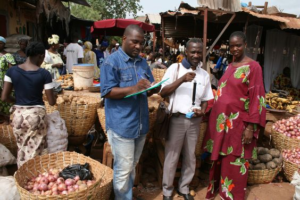Michigan State University (MSU) has emerged as both a regional and global leader in advancing food sustainability solutions. MSU has a clear focus on addressing pressing issues within the food industry, and its contributions to food security efforts resonate far beyond the Midwest.
In this quick read, we will explore some of the remarkable initiatives and projects that make MSU a trailblazer in the field of food sustainability.
MSU’s History of Agricultural Innovation
Michigan State University has a deep history of agricultural education and research. Founded in 1855 as the Michigan Agricultural College, the institution’s mission is intertwined with agriculture. MSU’s College of Agriculture and Natural Resources is a leading agricultural undergrad and graduate program in the US.
This strong connection to agricultural innovations is bolstered by several factors:
Michigan’s Agricultural Heritage: MSU’s location in Michigan, a significant agricultural state, aligns with its dedication to serving the needs of the local agricultural industry.
Commitment to Agricultural Education and Research: MSU has a long tradition of excellence in agricultural education and research, contributing to its strong agricultural programs.
World-Class Expertise: With a renowned faculty and advanced research facilities, MSU continues to drive innovation in agriculture.
MSU is one of the top destinations in the US for students to enter into the agricultural field.
Education and Knowledge Sharing
MSU’s commitment to food sustainability extends to education and knowledge sharing. The university disseminates research findings through various channels through the auspices of the MSU Food Security Group. This ensures that the latest advancements in sustainable agriculture and food systems reach a wide audience. This includes students, educators, policymakers, businesses, and agricultural communities.
By providing accessible resources and educational materials, MSU empowers individuals and organizations to make informed decisions that benefit both the environment and food security.
MSU students and faculty are also engaged in research and paper writing on crucial subjects on food security through international development papers that get published in international journals and syndicated papers. Recently, the Journal of Economic Literature published a paper titled “Agri-Food Value Chain Revolutions in Low-and-Middle Income Countries”, authored by four distinguished MSU professors.
Local Initiatives
In MSU’s immediate surroundings, there’s a strong emphasis on addressing food security issues. The MSU Student Food Bank, established in 1993, was the nation’s first student-run food bank. This effort helps kids be food secure by delivering over 110,000 pounds of food to over 6,000 students each year. One of the Food Bank’s main goals is to assist students in spending less money on food and more money on academic resources.
The 1855 Place Community Garden cultivates neighborhood unity while offering gardening education, increasing access to healthy foods, and promoting community belonging.
The Greater Lansing Food Bank is a vital non-profit that collaborates with MSU to provide emergency food to individuals and families in need throughout mid-Michigan. MSU students and employees can access these food pantries. Research on student food security, such as the Nourishing Success Survey, is another critical component, ensuring that food security challenges are well-documented.
Additionally, MSU runs various educational programs for students and the community, focusing on sustainability, local farming, and culinary skills. These programs not only empower individuals to make informed choices about their food but also promote sustainability in local agriculture.
Regional Outreach
Michigan State University Extension (MSU Extension) plays an important role in addressing food security across the state, with educators present in all 83 counties of Michigan. Over 342,000 adults and youth have participated in MSU Extension virtual nutrition education programs in 2021. These focus on food security for vulnerable populations. MSU students and employees can participate in programs such as the Expanded Food & Nutrition Education Program and the Supplemental Nutrition Assistance Education Program.
Additionally, the MSU Extension Master Gardeners Program trains gardeners who educate communities about sustainable practices. They support initiatives like the Giving Garden, providing fresh produce to residents who struggle with food insecurity.
The influence of MSU Extension extends beyond educational programs. The organization plays an active role in shaping local food policies, advocating for sustainable practices, and partnering with local communities to address food security issues.
Global Impact

MSU’s impact extends far beyond its campus borders. MSU’s researchers and experts actively engage with international partners to address food security and sustainability issues worldwide. These partner organizations include the USAID and the International Food Policy Research Institute. These efforts include several crucial dimensions:
Partnerships with Developing Nations
MSU works closely with governments, local organizations, and communities to support the development of agricultural practices that are adapted to the unique challenges faced by these regions, especially Sub-Saharan Africa. This assistance empowers these nations to enhance their food security while preserving their ecosystems.
Most of these initiatives are conducted through The Innovation Lab for Food Security, Policy, Research, Capacity and Influence (PRCI) at MSU. They include:
- Partnership with the Innovation Lab for Policy Leadership in Agriculture and Food Security (PiLAF) at the University of Ibadan. This partnership contributes to food security in the vast country of Nigeria which historically faces food security challenges.
- The PCRI has collaborated with the ISRA-BAME (Bureau of Macroeconomic Analysis of the Senegalese Agricultural Research Institute) to improve policy outreach in the Senegalese sheep sector.
Other collaborative partnerships with developing nations are to be found in Myanmar and South Africa. Through capacity building and knowledge sharing, the university empowers these regions to enhance food resilience and achieve sustainability.
Global Research Collaborations
Collaborative research is fundamental to MSU’s global food sustainability endeavors. The university collaborates with international research institutions and organizations to tackle multifaceted challenges. Research projects often focus on issues such as crop diseases, climate adaptation, and sustainable agriculture practices. These partnerships drive innovation and yield solutions that are applicable on a global scale.
Collaborative research projects are central to MSU’s global food sustainability efforts. The university teams up with international research institutions to investigate diverse challenges such as crop diseases, water scarcity, and sustainable farming practices.
Addressing Food Inequality
MSU is deeply committed to addressing global food inequality. Projects at the institution frequently focus on vulnerable communities. The goal is to ensure that everyone has access to safe, nutritious, and sustainably produced food.
MSU’s initiatives to address food inequity aim to ensure that people and their communities all around the world have access to safe, nutritious, and sustainably produced food. This method is consistent with the United Nations Sustainable Development Goals and the broader global food security goal.
Funding for Resilience
MSU has done groundbreaking work in the area of food sustainability through a 5-year program funded by the U.S. Department of Agriculture (USDA). The project received a $10 million grant, aiming to create more sustainable food systems, particularly in the Midwest.
This project recognizes the vulnerability of food systems to shocks like the COVID-19 pandemic, climate events, and foodborne pathogens. Led by Brent Ross, an associate professor in the MSU Department of Agricultural, Food, and Resource Economics, the team is focused on building food systems capable of withstanding concurrent shocks.
The project’s objectives include assessing supply chain risks, studying historical and projected shocks, and developing mitigation strategies. Using cutting-edge technology, researchers will model and simulate different scenarios while considering the needs of vulnerable populations.
Outreach and Dissemination
MSU is not content with simply conducting groundbreaking research; it is equally committed to disseminating knowledge and facilitating outreach efforts. The university recognizes that making an impact on global food sustainability requires sharing valuable insights and research findings with stakeholders at various levels.
To get a better understanding of some of the policy papers and research work authored by MSU, or to work on one yourself, expert writers can provide all the assistance you need. Check out this Masterpapers review to learn more about how to choose a professional writing company.
Now, let’s explore key aspects of MSU’s outreach and dissemination efforts:
Policy Briefs and Stakeholder Meetings
In addition to academic publications, MSU generates policy briefs that present research outcomes in a concise and actionable format. These briefs serve as valuable resources for policymakers, businesses, and local governments. Furthermore, MSU actively engages with stakeholders through meetings and discussions, fostering a collaborative environment in which diverse perspectives contribute to the development of sustainable food systems.
Emerging MSU-Led Sustainability Projects
Michigan State University is a leader in food sustainability projects. Several strategies aimed at promoting sustainability in the food system are used:
Soil Health Advancements
MSU’s commitment to sustainable agriculture extends to soil health. University researchers are actively involved in studies aimed at improving soil quality and minimizing concerns such as soil erosion. These programs are critical for preserving productive farmlands and ensuring long-term food security.
Climate-Resilient Crops
Addressing the challenges posed by climate change is a priority for MSU. Researchers at the institution are committed to developing crops that can endure changing climate conditions. These climate-resilient crops not only assure a consistent food supply but also lessen agriculture’s environmental impact.
Sustainable Livestock Practices
MSU is also dedicated to promoting sustainable livestock practices. Initiatives in the livestock industry focus on animal welfare, efficient resource utilization, and lowering greenhouse gas emissions. This strategy is critical for achieving a long-term balance between animal agriculture and environmental conservation.
Smart Food Distribution Systems
Efficient food distribution is a key component of food sustainability. MSU is working on innovative technologies and strategies for smarter food distribution. These systems reduce food waste, energy consumption, and transportation emissions, contributing to a more sustainable food supply chain.
Wrapping Up
If you want a career in Agriculture or are looking to make the world more food-secure, MSU is the right place for you. Here, you’ll interact with an expert faculty in world-class facilities alongside other bright minds like yourself.
MSU empowers students to tackle the problems of both today and tomorrow. By improving sustainability in agriculture, developing resilient systems, and growing both local and international partnerships, you too can be at the forefront of solving humanity’s challenges in agriculture.



